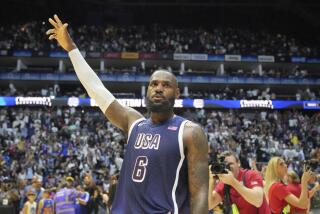Belov, Dead 14 Years, Not Forgotten by Coach
- Share via
Inside a small office in a deserted gym outside St. Petersburg, Russia, Vladimir Kondrashin has built a shrine to Alexander Belov, who scored the winning points in the Soviet Union’s historic victory over the United States in the championship game of the 1972 Summer Olympics at Munich.
Medals and pictures surround a letter of condolence from International Olympic Committee President Juan Antonio Samaranch, Spain’s ambassador to the Soviet Union when Belov died in 1978.
Kondrashin, who was Belov’s coach for several years with Spartak Leningrad in the Soviet Union’s basketball league and with the 1972 Olympic team, also has the player’s gold medal, which he keeps in his apartment.
“I have a photo of Belov in my car and I keep his medals,” Kondrashin said in a 1989 interview with the Associated Press. “But better that Belov be alive and he can keep his medals.”
In one of his last interviews before his death, with former Sovietski Sport reporter Anatoly Pinchuk, Belov recalled a Kondrashin who was not so sentimental.
Even before Belov left the court after scoring the dramatic winning basket as time expired, Kondrashin confronted him about an errant pass he threw with eight seconds remaining that allowed the United States to take a temporary lead.
“I regretted that we had made such a mess of the game,” Kondrashin told Pinchuk. “I called (to) Belov and bawled him out. ‘You dummy,’ I said to him. ‘How could you throw that ball (away)?’ ”
But as angry as Kondrashin had been at Belov, he was the only player the coach trusted to take the final shot.
“I knew him from childhood, so I was sure of him,” Kondrashin said.
Ivan Edeshko, who threw the length-of-the-floor pass that led to the winning basket, said that Belov deserves most of the credit.
“Everyone speaks to me about the golden throw, but there was also the golden catch,” he said. “The most important component is not the pass but the catch, and Alexander performed it brilliantly.”
Belov died when he was 26, reportedly of a heart attack. But there has been speculation within the Soviet Union that he was involved in smuggling and did not die of natural causes.
Special correspondent Sergei L. Loiko in Moscow and Times wire services contributed to this report.
More to Read
Go beyond the scoreboard
Get the latest on L.A.'s teams in the daily Sports Report newsletter.
You may occasionally receive promotional content from the Los Angeles Times.






